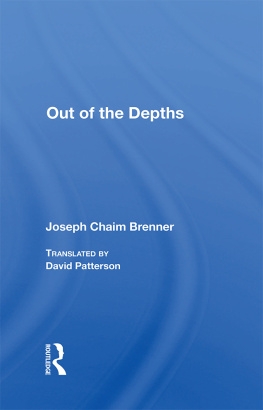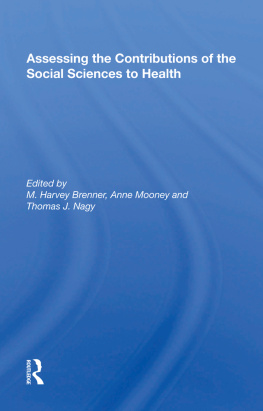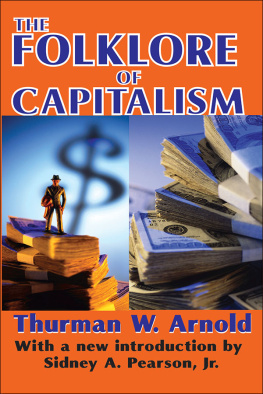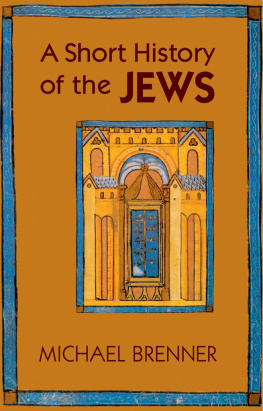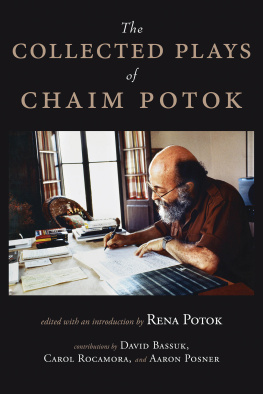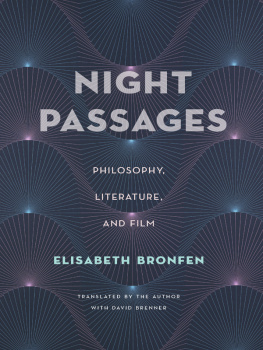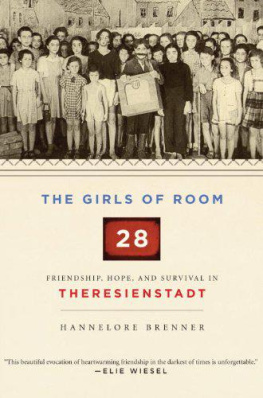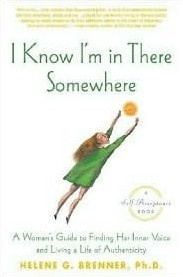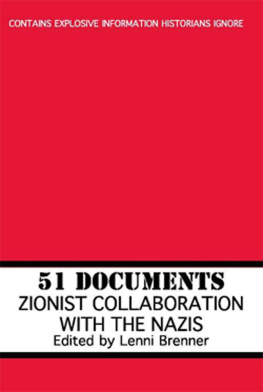Out of the Depths
Modern Hebrew Classics
David Patterson, Series Editor
This is a new series that will present in English formative works of lasting significance that appeared in Hebrew during the fifty years between approximately 1889 and 1939. The series, edited by David Patterson, president of the Oxford Centre for Postgraduate Hebrew Studies, will acquaint the English reader with the quality of modern Hebrew writing in its period of renaissance. Future volumes will include Eliezer Ben-Yehuda's autobiographical A Dream Realized, translated by T. Muraoko, and The World of Israel Weissbrem, translated by A. Crown.
Out of the Depths
Joseph Chaim Brenner
Translated By
David Patterson
First published 1992 by Westview Press, Inc.
Published 2019 by Routledge
52 Vanderbilt Avenue, New York, NY 10017
2 Park Square, Milton Park, Abingdon, Oxon OX14 4RN
Routledge is an imprint of the Taylor & Francis Group, an informa business
Copyright 1992 Taylor & Francis
All rights reserved. No part of this book may be reprinted or reproduced or utilised in any form or by any electronic, mechanical, or other means, now known or hereafter invented, including photocopying and recording, or in any information storage or retrieval system, without permission in writing from the publishers.
Notice:
Product or corporate names may be trademarks or registered trademarks, and are used only for identification and explanation without intent to infringe.
Library of Congress Cataloging-in-Publication Data
Brenner, Joseph Chaim, 18811921.
[Min ha-metsar. English]
Out of the depths / J. C. Brenner; translated by David Patterson.
p. cm. (Modern Hebrew classics)
Translation of: Min ha-metsar.
ISBN 0-8133-1427-5
I. Title. II. Series.
PJ5053.B7M5713 1992
892.4'35dc20 91-39993
CIP
ISBN 13: 978-0-367-28206-6 (hbk)
For Deborah, Louise, Daniel and Benjamin
THE HEBREW ORIGINAL of the story Min ha-Meizar translated here as "Out of the Depths"first appeared in the periodical Ha-Olam, Vienna, 1908-1909. It draws upon Brenner's experiences in his London period during the years 1905-1908, when he lived and worked in a printing house in the Jewish East End. As in most of Brenner's work there is a strong connection between his artistic creativity and real life. The story is concerned with a group of immigrants from Russia who work for a Jewish daily newspaper, and are caught up in a conflict with the owner which leads to an unsuccessful strike. The narration is fragmentary and episodic, but an underlying ethic of considerable force serves as a unifying factor. The general misery and poverty of the workers' lives are relieved by the moral values enshrouded in the personality and actions of the central character. As so often in Brenner's fictions, the message transcends the local and parochial background and assumes a universal tone.
Throughout Brenner's lifetime Hebrew was in a state of flux as writers struggled to give expression to the phenomena of modern life. Their search for vocabulary and the attempt to create idiomatic conversation using words and expressions which had not yet gained universal acceptance often result in a text which is difficult to understand. The problems are compounded by Brenner's literary techniques, which include stream of consciousness, fragmentation, shifting perspectives, emotive punctuation and the direct infusion of vocabulary from Yiddish, Russian, German and English with startling effect. He made a considerable contribution to Hebrew prose, not least because he portrayed society with shattering honesty.
This first English translation attempts to capture the flavor of Brenner's style while conforming to the demands of English idiom. The Hebrew months have been approximately equated with the English calendar for the reader's convenience at the cost of the overtones attached to the originals.
I am grateful to Joshua Knaz, Yoram Bronowski and my wife, Jose, who read the manuscript and offered valuable suggestions. This version is offered to the English-reading public with the sincere hope that it may convey something of the quality of Hebrew literature in the first decade of this century.
David Patterson
Oxford Centre for Postgraduate Hebrew Studies
Introduction:
Joseph Chaim Brenner
OF THE MAJOR CURRENTS in Jewish history throughout the last one hundred years, at least three can be traced to the wave of antiJewish violence in Russia which followed the assassination of Czar Alexander II in 1881. In the first place, many young Jews finally gave up all hope of achieving emancipation by peaceful means and threw their energies behind the revolutionary movements, in which many of them gained prominent positions. When the Bolsheviks seized power in 1917, the control of Jewish affairs was placed in the hands of Jewish revolutionaries, whose primary aim was to achieve total assimilation in an atheist society. It was largely due to their efforts that the social, cultural, religious and national hopes of Russian Jewry were effectively destroyed and that the Jews of Russia were denied any real contact with their fellow Jews abroad. Second, in the years between 1881 and 1914 almost two million Jews left Russia in search of greater freedom and opportunity in Western Europe and the Americas. The great majority found its way to the United States,
An earlier version of this introduction was published in Jewish Book Annual volume 38, 1980-81. I am grateful to the editor for permission to use it in this present volume. thus gradually shifting the main center of Jewish activity from East to West. Third, a small but steady trickle of Jews made its way southwards to Palestine and began to establish agricultural settlements which formed the backbone of the new Yishuv, and paved the way for the creation of the State of Israel.
All three of these momentous events were reflected in the personal odyssey of Joseph Chaim Brenner. Brenner was born in 1881 in Novymlini, a little town in the south-east portion of the Russian Pale of Settlement, and was killed in Arab riots outside Jaffa in 1921. At the age of twenty-three he fled from Russia and lived in the East End of London for four years prior to settling in Palestine in 1909. During his own lifetime he was recognized as a major figure in modern Hebrew literature, and after a period of comparative neglect his reputation has grown steadily in recent years.
The originality of his writing is matched by a force of personality so striking that the impact which he exerted on his contemporaries is immediately understandable. For that reason it seems strange that the first English translation of any of Brenner's major works should have appeared only half a century after his death. The reason may lie, perhaps in the fact that he was clearly so uncomfortable a person.
Clearsightedness is a rare and admirable quality, but the ability to see too clearly can be a disquieting gift. In Brenner's case, an insight bordering on the prophetic turned him into the conscience of his generation. His writings performed the function of a surgeon's knife, probing and incising his people's spiritual wounds, and ruthlessly gouging out the dead and rotting flesh. Unable by temperament to see the world through rose-colored spectacles and incapable of self-delusion, he portrayed life as he saw itand what he saw was rarely attractive.

